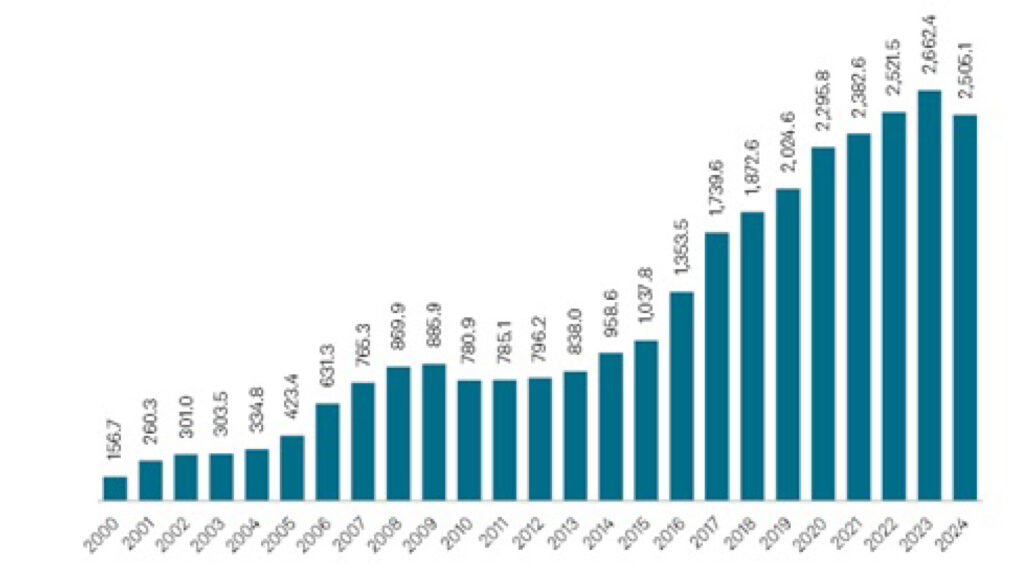May 4, 2025
With all the chatter about tariffs, stock market fluctuations, and political headlines, we’re hearing one question more and more: Is now really the best time to sell my company? Since tariffs were announced, we’ve sold several companies at valuesthat met or exceeded or clients’ expectations. The reason why is because our clients continued to perform, and the buyers saw a must-have element. Furthermore, we’re not seeing diminished buyer interest in companies we bring to market. There’s always something happening in the world that can make it fell like now isn’t the right time. Over the past 30+ years since our firm’s founding in 1993, we’ve seen recessions, pandemics, natural disasters, wars, political unrest, and financial crises – yet great companies still sell. The best time to sell is not when the market is calm (because it rarely is), but when your business is strong and you’re personally ready.
Market-Disrupting Events
Year Event
2025 Tariff-driven trade war & stock market volatility
2024 U.S. election uncertainty
2023 Interest rate spikes leading to banking system stress (SVB & Credit Suisse
failures)
2022 Russia-Ukraine war
2021 Supply chain crisis & inflation surges
2020 COVID-19 pandemic & stock market crash
2016 Brexit & U.S. election uncertainty
2015 Chinese stock market crash
2014 Oil prices collapse & Russia annexes Crimea
2013 Government shutdown
2011 U.S. debt ceiling crisis & S&P downgrades U.S. credit
2010 European debt crisis
2009 Great Recession
2008 Global financial crisis & Lehman bankruptcy
2007 Subprime mortgage crisis starts
2005 Hurricane Katrina & oil prices spike
2003 Iraq War begins
2002 Corporate scandals (Enron, WorldCom)
2001 9/11 terrorist attacks & recession declared
2000 Dot-com bubble bursts
1998 Russian debt default
1997 Asian Financial Crisis
1995 Barings Bank collapse
1994 Bond market crash & Mexico peso crisis
M&A Activity in Uncertain Times
While market volatility may cause periods of hesitation, M&A markets remain active —especially for high-quality businesses. Private equity groups and strategic buyers often see uncertain environments as an opportunity to deploy capital. Private Equity: Over the past few decades, private equity has continued to= experience remarkable growth. The surge has resulted in substantialaccumulation of uninvested capital, referred to as “dry powder”. Today dry powder remains at record levels, exceeding $2 trillion, up from just over $150 billion in 2000. With that capital comes pressure—firms are under significant pressure to deploy it. Despite market volatility, inflation concerns or geopolitical risk, private equity buyers continue to pursue strong, cash-flowing businesses with growth potential—especially in the lower middle market. For owners, this means there is still a deep pool of buyers looking for companies to acquire.
Strategic Buyers: But it’s not just financial buyers. Strategic acquirers—industry players with long-term growth goals—are also highly active in uncertain environments. Market volatility often prompts strategics to double down on acquisitions to expand market share, acquire complementary capabilities and accelerate growth when organic investment slows. Whether it’s to enter a new vertical, add recurring revenue or bring in talent, strategics often view downturns as an ideal window to make moves—especially when high quality businesses come to market.
Global private equity dry powder trend, 2000-2024 ($B)
 Source: S&P Global
Source: S&P Global
From the Front Line: Buyer Interest Remains Strong
At Woodbridge, A Mariner Company we are not seeing a slowdown in buyer interest. While the headlines may focus on volatility, we are not experiencing widespread pressure on valuations or multiples. Buyers remain aggressive for well-run, profitable companies with strong fundamentals
Key Takeaways
Each year can bring unforeseen events impacting market conditions. Even in turbulent times, there’s a robust market for quality companies. If your business is strong and you’re personally ready, you don’t need to wait for “perfect conditions” you need the right buyer and a sound strategy. By focusing on the health of your business and your personal preparedness, you position yourself for a successful sale, irrespective of external uncertainties.
A Call to Action
If you’re considering your options—or you’ve received interest in your business-andwant to understand the current market, valuation potential, and how to prepare, now isa great time to start the conversation.